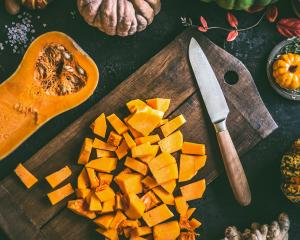
Contamination of fresh produce is emerging as a major food safety challenge, Lincoln toxicology Prof Ravi Gooneratne says.
While it is generally processed ready-to-eat and cold-stored meat and dairy products that are considered high-risk foods for food poisoning, recently several listeriosis outbreaks have been linked to fresh produce contamination around the world.
Studies have also detected L. monocytogenes, bacterial infections that cause illness, in fresh produce samples and even in some minimally processed vegetables.
In New Zealand this year LeaderBrand Produce Ltd recalled batches of various salads as they may have contained listeria, while last year, Delmark Baby Spinach packs were recalled after testing positive for listeria.
Prof Gooneratne said the greatest risk was when fresh vegetables and fruits were consumed without being washed.
Vegetables also needed to be stored in a fridge to increase shelf-life and inhibit bacterial growth.
Prof Gooneratne has co-authored a recent paper and an article in science journal Food in collaboration with Dr Malik Hussain, a Food Authority of New South Wales, Australia, technical officer, on the threat.
The incidence of foodborne outbreaks caused by contaminated fresh fruits and vegetables has increased in recent years.
Most outbreaks have been reported in the United States, Europe, Canada, and to a lesser extent in Australia and New Zealand.
''These food-borne outbreaks are not only a burden on public health but also cause heavy economic loss to the food industry.''
Several groups of microorganisms can colonialise or contaminate fruits and vegetables at any point in the food supply chain.
Pathogenic microorganisms such as E.coli, Salmonella, L.monocytogenes and norovirus are commonly associated with contaminated fresh produce.
Various types of fresh produce, including cantaloupe, strawberries, mangos, leafy green vegetables, lettuce, salad mixes, sprouts, cabbage, cut celery and radishes, are potential vehicles for transmission of pathogens.
The severity of listeriosis can range from mild gastroenteritis to severe disease conditions (septicaemia, encephalitis, meningitis, abortions and stillbirths) and can result in a high fatality rate in immune-compromised populations. Some people have a higher risk for developing listeriosis, such as the elderly.
The mortality rate can be 20%-30% for those who contract listeriosis.
New products aimed at making fresh food more accessible and convenient to appeal to the consumer may also increase food safety risks, he says.
''Cut fruits and vegetables have a higher microbial risk profile than the 'whole' produce. Therefore, it is not surprising that delicatessen salads made up of the same vegetables can be more contaminated.
''One of the problems associated with fresh produce is that, unlike tinned or packaged foods, there is a lack of information on the shelf-life and expiration dates,'' he says.
Potatoes exposed directly to the sun can result in solanine production, which can result in nausea, vomiting, diarrhoea, headache, dizziness, and fever. In more severe cases, hallucinations, paralysis and even death can result.
When exposed to rain and sun at over 20degC, Salmonella, E.coli or L.monocytogenes will multiply to toxic levels in cauliflower.
There are also risks associated with fresh produce sold by street vendors.
Consumption of fresh fruits and vegetables is important for a balanced diet and healthy lifestyle but it needs to be safe, he says.
''It is important to understand the nature of fresh produce safety challenges, contamination sources, risks to the consumer, and approaches to eliminate or reduce the level of contaminants.
''Scientific understanding is rapidly evolving in this important area of food safety.''
Food safety, especially when exporting, will be the focus of the Food Integrity Conference being held in Auckland in June.
International speakers include leading global food safety litigator, William Marler, from the US; Asia Pacific Centre for Food Integrity director, Dr Helen Darling and a specialist on Chinese food safety, chair of Goke Agricultural Machinery and Yimu Technology, Li Wei, among others.
It will be followed by a course on helping food producers develop strategies to guard against acts intended to cause wide-scale harm to their consumers and ruin brand reputation, run by the Food Protection & Defence Institute, a United States of America Homeland Security Centre of Excellence.
Seasons - By Alison Lambert - Available for purchase now!

The Otago Daily Times and Alison have collaborated to bring you her first cookbook – Seasons.
This book is the ultimate year-round cookbook. Seasons is filled with versatile recipes designed to inspire creativity in the kitchen, offering plenty of ideas for delicious accompaniments and standout dishes that highlight the best of what each season has to offer.
$49.99 each. Purchase here.
$44.99 for ODT subscribers. Get your discount code here.













